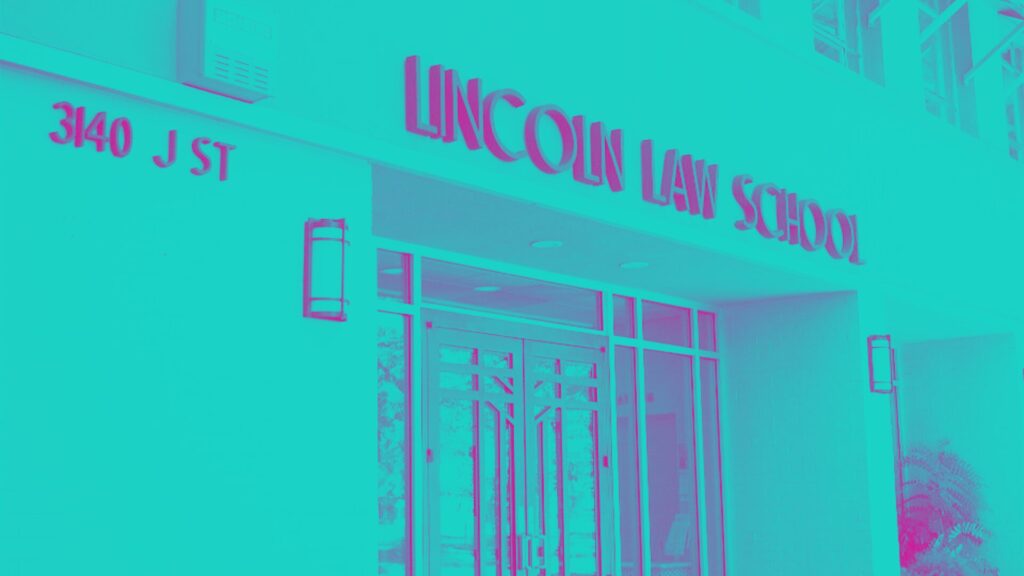TABLE OF CONTENTS
Introduction
Lincoln Law School Accreditation
Lincoln School of Law Ranking
Pros and Cons of Attending a Non-ABA Accredited Law School in the US
Lincoln Law School Success Stories
Tuition Cost at Lincoln Law
5 Crucial Law School Application Requirements
Valuable LSAT Prep Steps for Success
Conclusion
Introduction
Started in 1969, Lincoln Law School is a public law school in Sacramento, California which highlights accessible legal education, in particular, its evening program for working professionals. Beyond its reputation and inclusive atmosphere, the school prepares graduates with the skills and knowledge for many legal careers with personalized attention from faculty and practical legal education. Because they’re in Sacramento, students have extensive networking and internship experience in the local law community.
This blog post covers Lincoln Law School rankings, data, and application suggestions to help potential students make a good choice regarding their legal education. This is also to set apart that Lincoln Law School is different from Lincoln University Law School and Abe Lincoln Law School.

Lincoln Law School Accreditation
Lincoln Law School of Sacramento has been accredited by the Committee of Bar Examiners of the State Bar of California. However, this accreditation is limited and may affect job outcomes as many companies, especially non-California firms or big law firms, seek graduates from fully ABA-accredited colleges. Limited accreditation might also help make practicing law outside California difficult because of differing bar admission requirements in other places. Regardless of these restrictions, a degree from Lincoln Law School still qualifies for careers in federal departments, public interest organizations, smaller businesses, or self-employment. Opportunities might be somewhat limited compared to ABA-accredited schools, but work, techniques, and networking can lead to a successful legal career, demonstrating the need for continuous improvement and opportunities, however the accreditation status.
Lincoln School of Law Ranking
Knowing where Lincoln School of Law ranks in law school rankings is crucial in assessing the institution. Although limited accreditation impacts its eligibility for some lists, examining available rankings still gives insight into where it ranks among other schools. Rankings can help prospective students evaluate offerings and make sound decisions about legal education. Although not the only indicator of quality, rankings measure reputation, faculty expertise, resources, and overall suitability for career objectives.
| World Ranking | 10,217 out of 14,131 |
| North American Ranking | 2,322 out of 2,597 |
| US Rankings | 2,223 out of 2,496 |
| California Rankings | 213 out of 249 |
| Sacramento Rankings | 2 out of 3 |
Pros and Cons of Attending a Non-ABA Accredited Law School in the US
Consider all alternatives before applying to law school – even non-ABA accredited law schools. Determining if you should go to such schools is crucial information for making an educated choice regarding your legal education. We discuss the benefits and drawbacks of joining a law school with no ABA accreditation and how it may impact your work opportunities following law school.
Pros
- Flexibility: Non-ABA accredited law schools usually provide more flexible schedules to accommodate student family or work obligations.
- Lower Cost: Tuition fees at non-accredited law schools can be much less than at ABA-accredited schools and universities, which can lessen the economic burden of getting a legal education.
- Unique Opportunities: Some non-accredited law schools provide niche fields of law or programs that could match your career interests.
- Alternative Career Paths: Though most employers want ABA accreditation, a law school that isn’t accredited does not necessarily shut doors. You can still go after different legal professions, in settings where accreditation might be much less critical such as federal agencies or small law firms.
Cons
- Limited Recognition: Graduating from a non-ABA accredited law school might prevent law careers in crowded markets or in prominent law firms that hire from accredited law schools.
- Bar Exam Challenges: Certain American states call for bar admission for graduates of non-accredited law schools, making it harder to practice law outside of the college’s jurisdiction.
- Lack of Resources: Non-accredited law schools might offer fewer resources including job services, social networking, and instructors which might impact the quality of your training and preparation for the legal profession.
- Risk of Closure: Non-accredited law schools might be more scrutinized and monetarily fragile, and you run the chance of the school closing or even losing accreditation. This can jeopardize your time and effort as a student plus possibly sabotaging your academic career and future objectives.
While the advantages of attending a non-ABA accredited law school include flexibility and lower fees, you must weigh the pros with job possibilities and lacking resources. Research and consider the effect of a non-accredited institution like Lincoln Law School on your long-term objectives and dreams in Law before enrolling.
Lincoln Law School Success Stories
Success stories from Lincoln Law School in Sacramento showcase the accomplishments of its graduates outside the accreditation setting in the legal field. These accounts illustrate the need for perseverance and determination toward post-law school career objectives. Regardless of whether you go to an accredited institution, your career after graduation affects your success in the legal profession, highlighting the benefits of hard work and resilience. These anecdotes illustrate how determination and targeted career paths can accomplish one’s goals, regardless of law school accreditation.
Judge Donald J. Currier
Judge Donald J. Currier is a 1986 graduate of Lincoln Law School whose profession highlights a dedication to legal excellence and service to the community. As a Superior Court judge in El Dorado County, California, he’s upheld values of justice and fairness, ensuring all have legal access options. His leadership to promote legal education and advocacy inspires many to become lawyers and help their communities. He had left a lasting impression on the legal society and profession.
Judge Laurie Earl
Judge Laurie Earl, the 2012 Lincoln Law School Alumnus of the Year, has established a legal profession devoted to justice. From public defender to judge, she works for justice and equality in the court system. Reputable for her calm and principled handling of challenging cases, Judge Earl is respected by peers and communities alike. Aside from the courtroom, she mentors aspiring lawyers. His devotion to justice has lasted a lifetime in society.
Sheriff Scott Jones
Sheriff Scott Jones is an example of hard work and dedication. Following graduation from Lincoln Law School in 2000, he worked in Law enforcement as the Sheriff of Sacramento County in 2010. Committed to public services and community safety, Sheriff Jones has led a few initiatives to curb crime and enhance public trust in police. His leadership has helped produce new approaches to addressing community issues such as mental health and substance abuse problems. Through his relentless work, Sheriff Jones has enhanced the quality of life for countless individuals and has set an example for brand-new police officers.

Tuition Cost at Lincoln Law
Tuition is considerably decreased at Lincoln Law School compared to many law schools, making legal education more available to students. With tuition beginning at USD 820 per unit, totaling USD 8,200 per semester, Lincoln Law School’s courses are inexpensive for many students – particularly those financially strapped. This lower cost means students can pursue legal education without big debt loads to construct their legal education.
5 Crucial Law School Application Requirements
Starting your path to a law school degree calls for a focus on critical application requirements. Each requirement impacts your admission and application to Lincoln Law School or any law school of your choosing. By meeting these critical application requirements, you boost your chances of admission and launch your law school experience. Each component of your application is a first step towards obtaining a law school degree along with a productive legal career.
1. Law School Resume
Your law school resume showcases your grades, education, and extracurricular pursuits. A well-written resume provides admissions committees with a sense of your abilities and potential for legal work.
2. Law School Personal Statement
Your law school personal statement describes your personality, experiences, and motives. Writing a personal statement can enable you to get noticed among candidates and prove you are all set for law school.
3. Law School Letter of Recommendation
Strong law school letters of recommendation from teachers, employers, or mentors confirm your capabilities, character, or promise for law school success. These letters offer information about your credibility and capabilities as a candidate.
4. Law School Diversity Statement
A law school diversity statement may explain unique experiences or challenges that shaped your identity. Highlighting diversity could assist the law school community and show your support for inclusion and understanding.
5. Law School Addendum
If there are some discrepancies or weaknesses in your application, for instance, gaps in education or low grades, a written law school addendum may give explanations and context. Addressing possible concerns proactively shows resilience and accountability.
Valuable LSAT Prep Steps for Success
The LSAT decides your law school admission and journey by evaluating your critical thinking, and analytical reasoning – all critical components in law school success. Stick to these LSAT prep steps from Odyssey Test preparation to get the skills and confidence to take the LSAT for your law school career. Begin your LSAT prep today and make a future in law!
-
LSAT Prep Course
Enroll in our LSAT Prep Course to master the skills and strategies needed for success on this crucial exam. These courses give methods, and strategies, along with practice exams to get you at ease with the LSAT format and prepare for test day.
-
LSAT Tutoring
Elevate your LSAT performance with personalized guidance and achieve the LSAT score you require to get admitted to your dream law school. Consider LSAT tutoring for personalized support. Our experienced tutors can give you specific suggestions, highlight areas for improvement, and customize research designs for your requirements and learning style so you can take the LSAT confidently.
-
LSAT Free Class
Take an LSAT free class from Odyssey Test Prep to sample the teaching style and course material. These classes let you experience how we do LSAT preparation and action so you can make educated study choices.
-
LSAT Writing
Not to be forgotten is the unscored writing sample included with your LSAT score report, LSAT writing. Write coherent and solid arguments in the allotted time to show your analytical and writing abilities to law school admissions committees.
-
Law School Admissions Consulting
Gain insights and assist with your law school application with law school admissions consulting services. Secure your spot in a top law school with our Law School Admissions Consulting – let us guide you through the competitive admissions process. From writing a personal statement to selecting the right schools, our consultants can get you into your dream law school.
Conclusion
These discussions about Lincoln Law School have provided light on how the institution operates and prepares its students for law school success. From its low tuition to its rigorous application process, Lincoln Law School lets dreamers become lawyers without breaking the bank. Additionally, utilize resources like Odyssey Test Prep and the LSAC to help you prepare for the LSAT and boost your application with expert advice.
With effort, determination, and access to these resources, you can start your legal career confidently.

